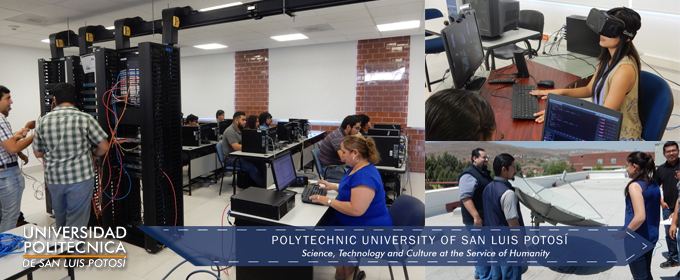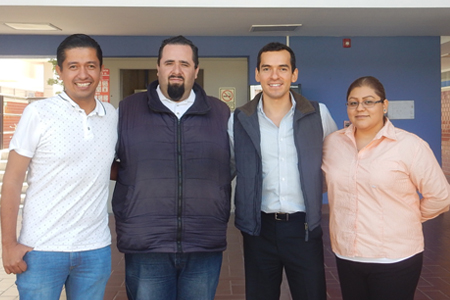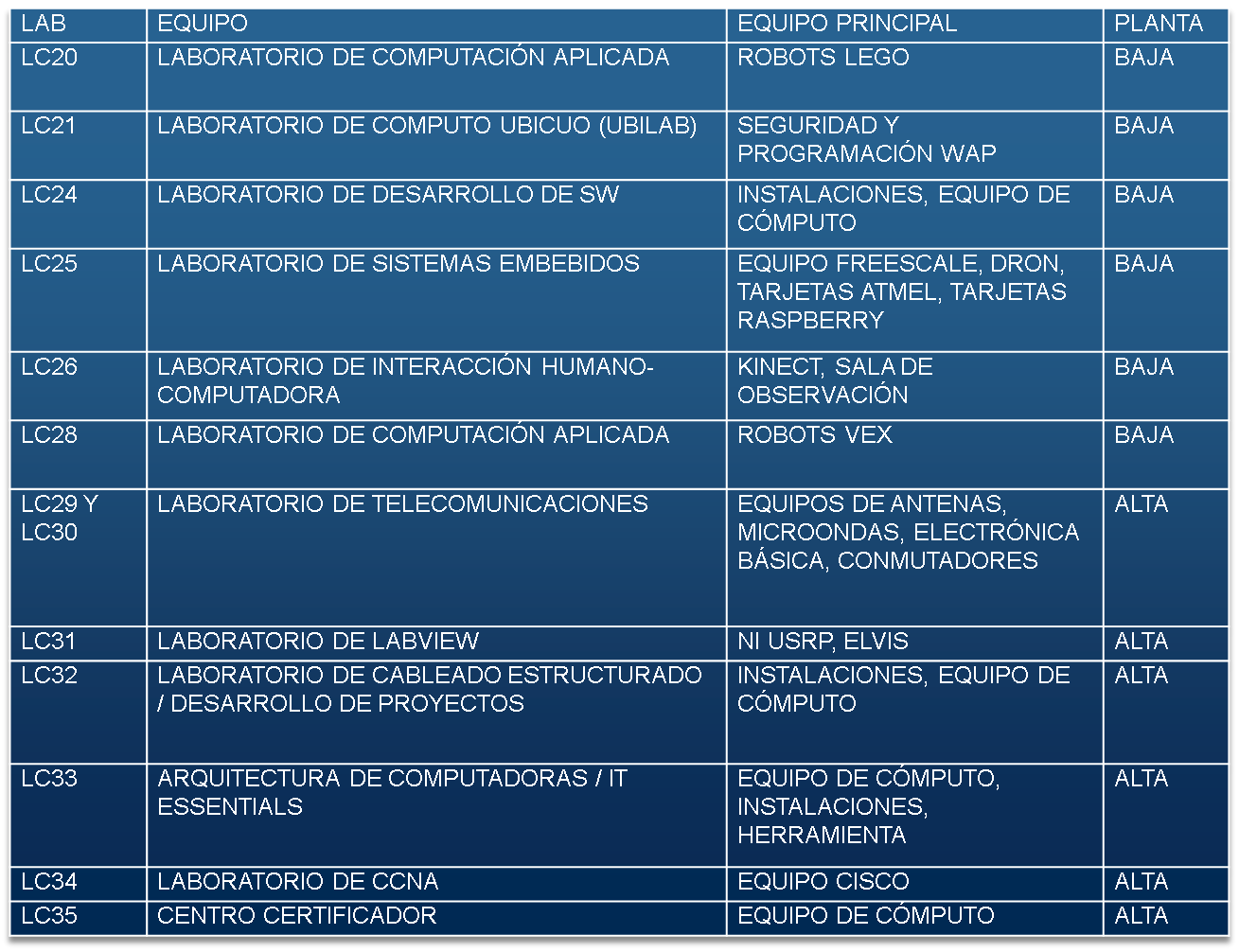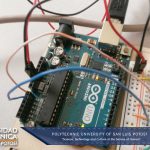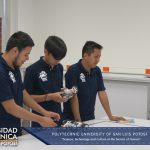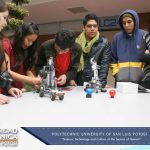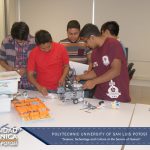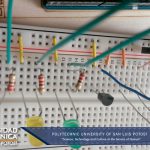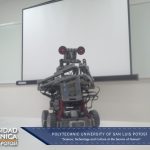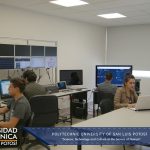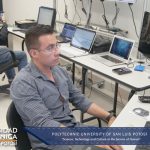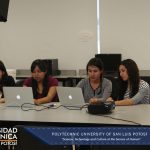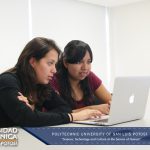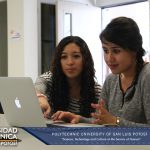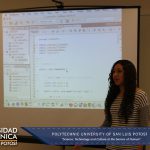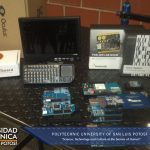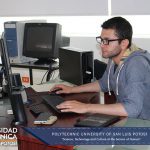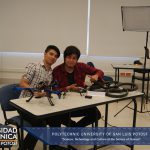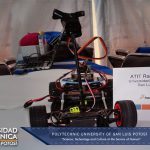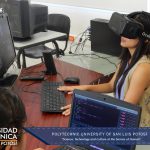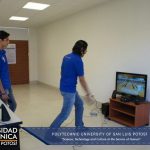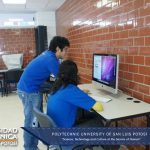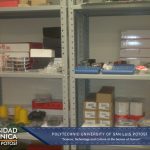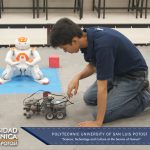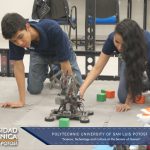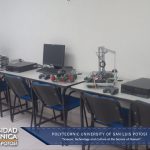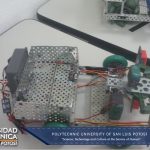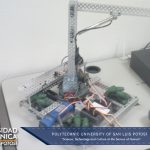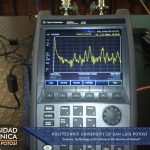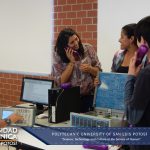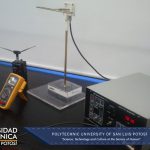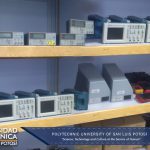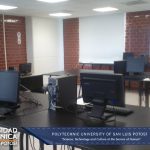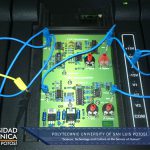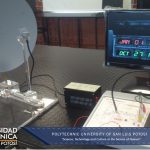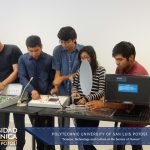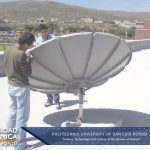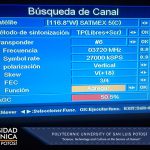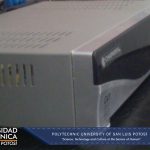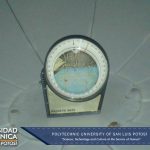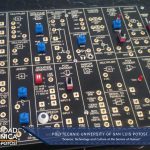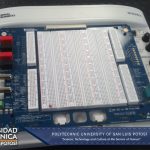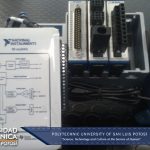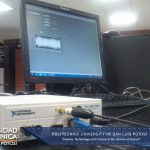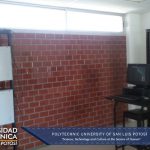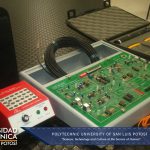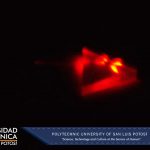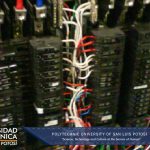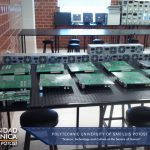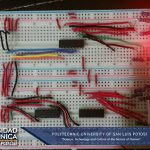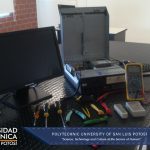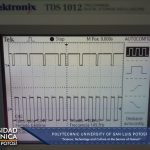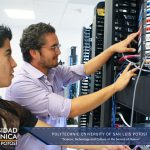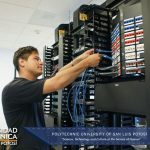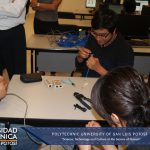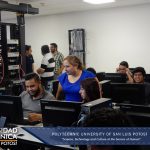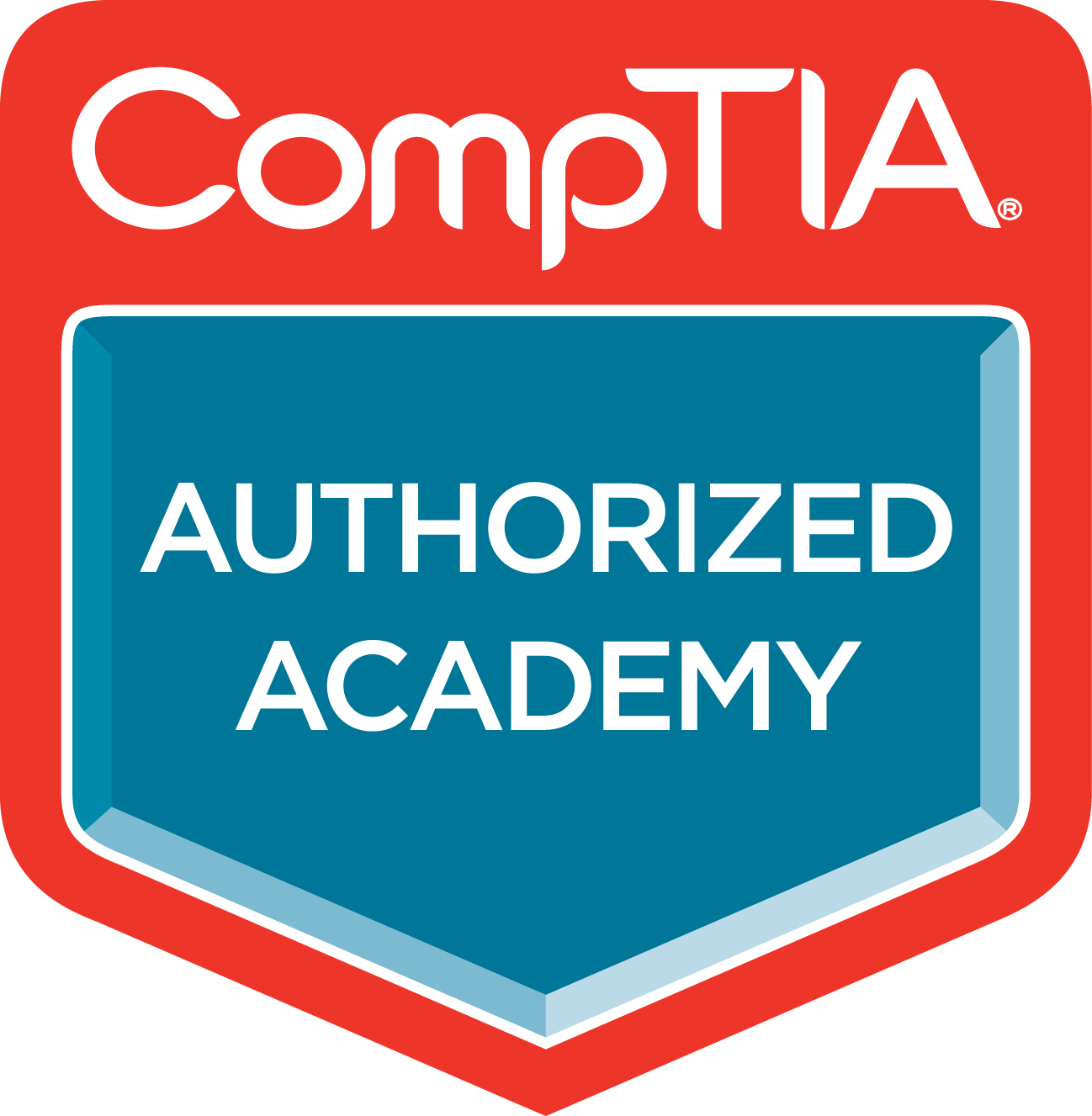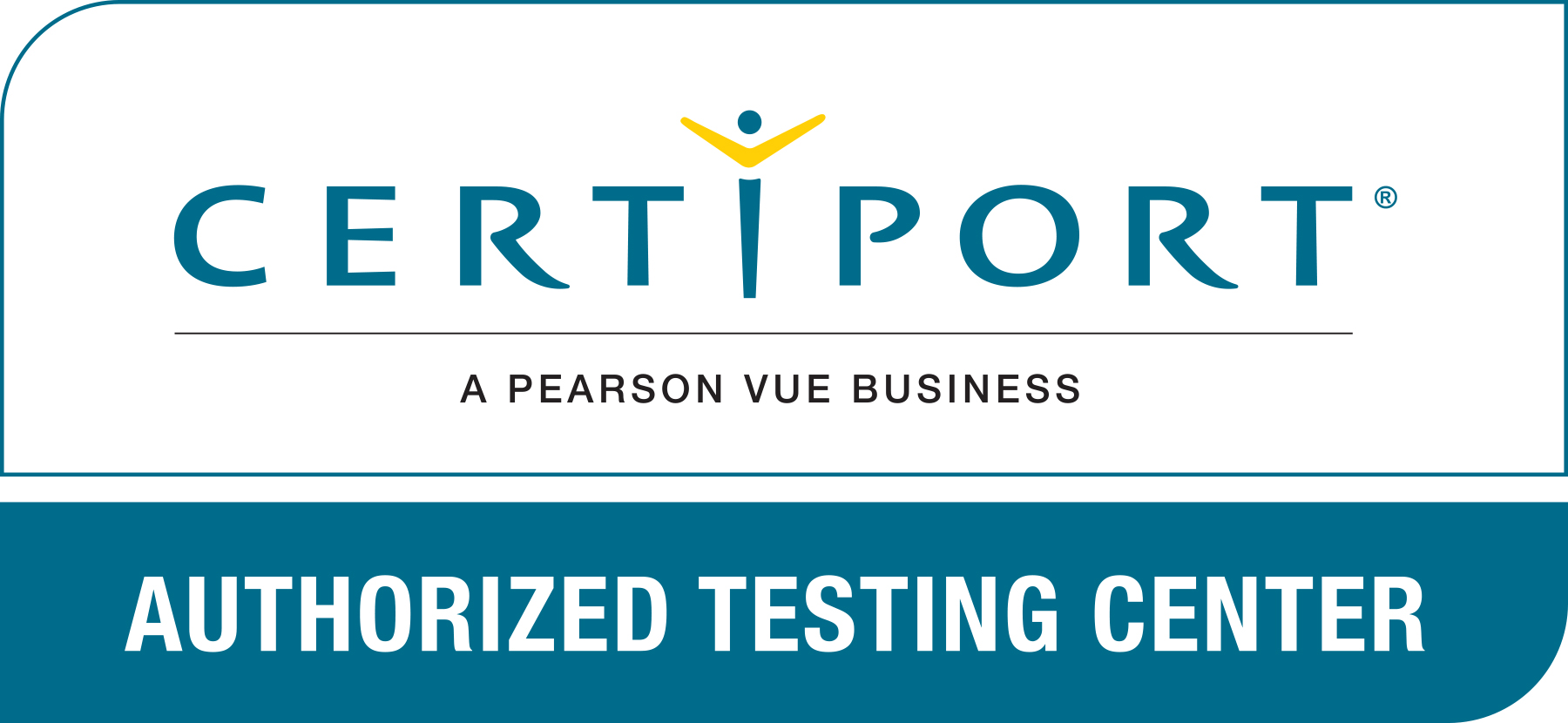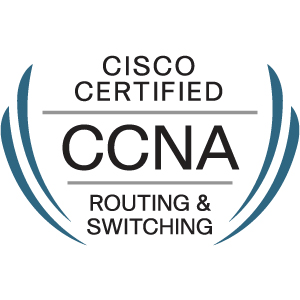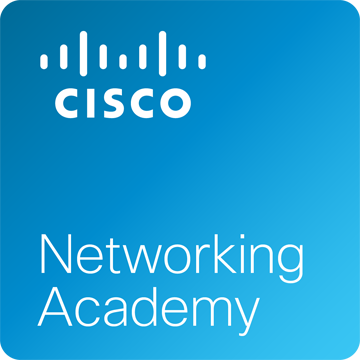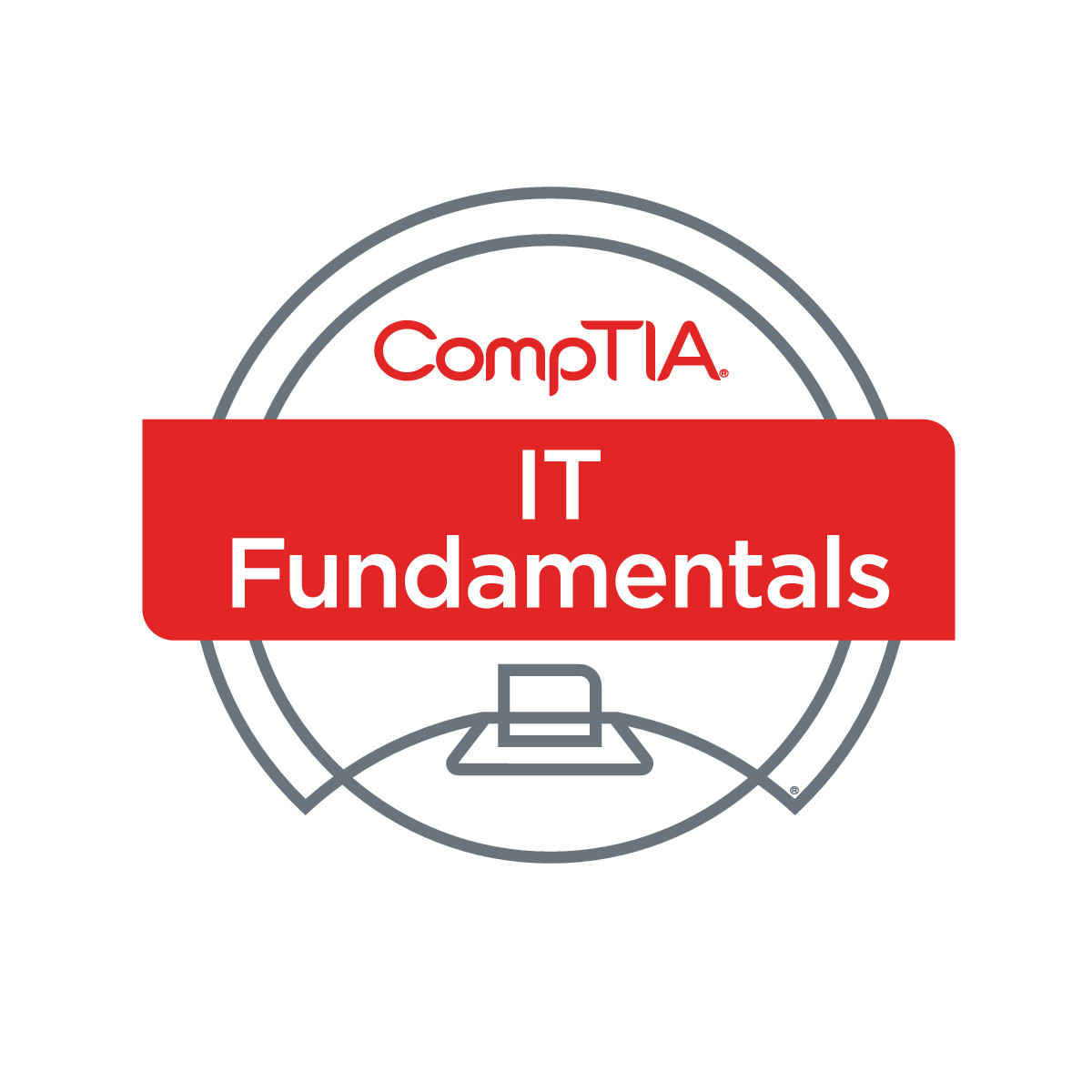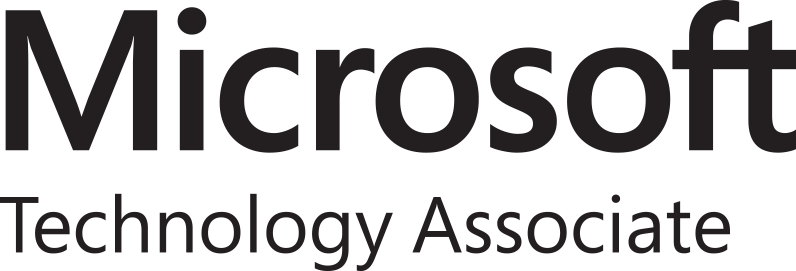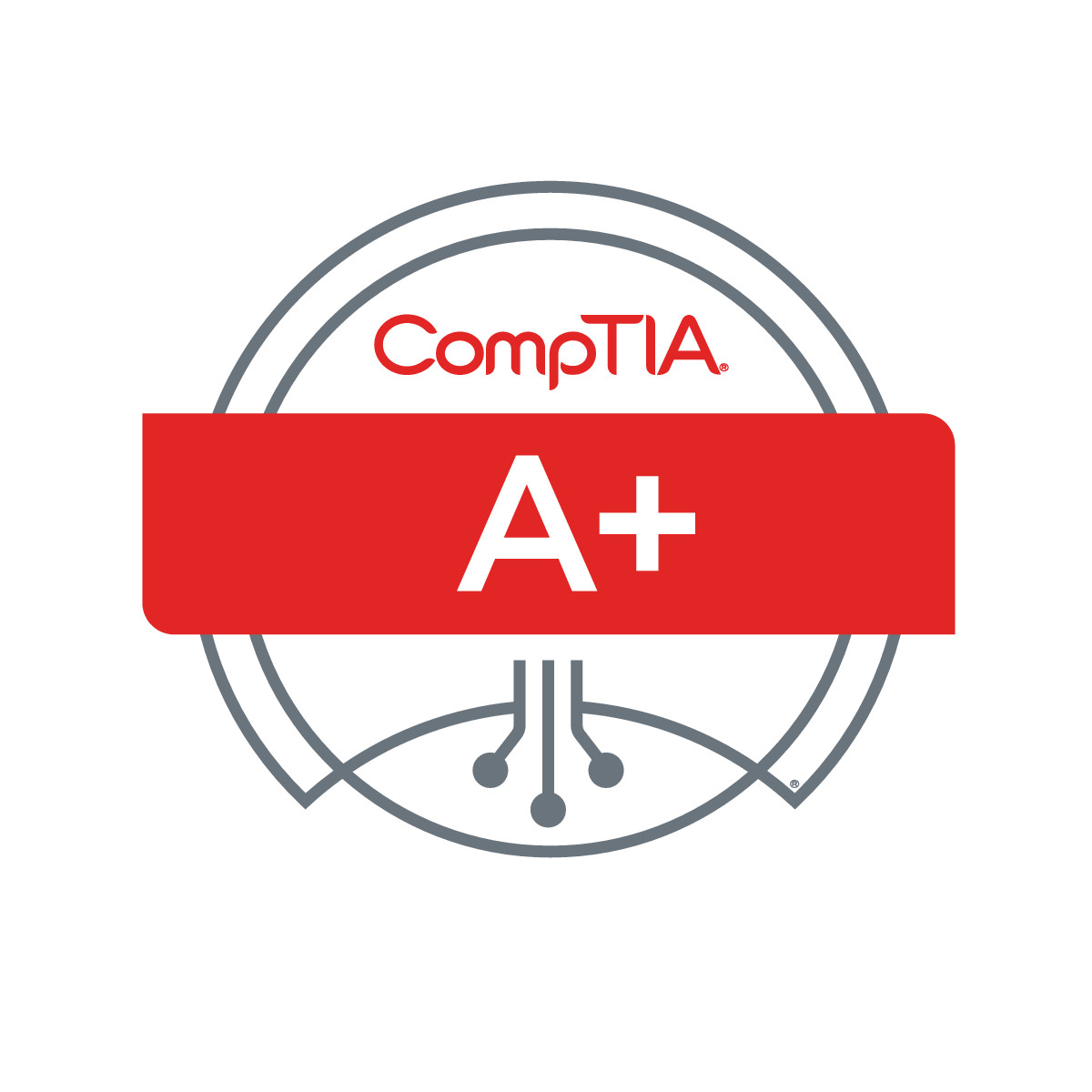Laboratories specially equipped for coursework in degrees in Telematics Engineering and Information Technology Engineering are located in the Center for New Technologies (CNT). The aim of this space is to complement the knowledge acquired in the classroom by developing skills through practice and the use of specialized laboratory equipment.
In accordance with the mission of the UPSLP, the CNT contributes to the comprehensive training through the development and application of new knowledge by giving students access to the infrastructure and human resources necessary to perfect skills that go beyond learning in the classroom. This training also allows students to be in contact with equipment similar to that which is used in the productive sector, where they will one day be able to further grow.
In regards to the institutional vision, this center seeks to promote through guided practice the efficacious use of the infrastructure in academic work by staying on the cutting edge in the integration of new technologies as a fundamental part of the training process.
The CNT is available for any type of academic activity for students and professors that belong to the degrees in Information Technology Engineering and Telematics Engineering in order to facilitate the development of academic and attitudinal activities and the strengthening of technical skills specific to these areas. In general, these areas are for use in teaching, research, engagement and consulting.
Currently, the CNT has 16 specialized laboratories that have been equipped in phases according to different knowledge areas, such as robotics, programming, IT security, forensic computing, cable structure, antennas, ubiquitous computing, software development, networks and communication, telecommunications, human computer interaction, and IT Essentials© and CCNA© certifications. The CNT is also a certifying center for Conocer, Certiport© and Pearson Vue©, among others.
The staff that currently work in the CNT are:
-
Eng. Atzel Yazmin Rivas Ortega: ITI and Applied Programming Laboratories
-
Eng. Luis Fernando Turrubiartes Gómez: ITI and Applied Programming Laboratories
-
Eng. Hugo Hever Olvera Youshimatz: ITEM, and ITI and ITEM Specialized Laboratories
-
Eng. Manuel Alejandro Camarillo Dorantes: ITEM, and ITI and ITEM Specialized Laboratories
Below you can see the name of each lab, the main equipment and the location.
LC 20: Applied Computing Laboratory.
This space has the equipment to conduct practices related to robotics and applied programming since it has basic computing equipment, kits to build and program LEGO robots as well as the other technologies, such as Arduino.
In the Applied Computing Laboratory, practices for the following subjects are done: Introduction to Computing, Programming I, II and III, Programming Languages, and other subjects that require the development of projects related to programming and robotics.
- Automation Practice Tasks with Arduino© UNO
- Robot testing area
- LEGO © robots for measuring physical parameters (catapult)
- LEGO © robot development and assembly area
- Prototyping for IoE (Internet of Things) with Arduino ©
- VEX © IQ Plastic Prototype
LC 21: Ubiquitous Computing Laboratory (UBILAB)
This laboratory is mainly designed for the development of projects related to the areas of IT Security and programming for mobile devices.
There is computer equipment that has a variety of technical characteristics that allow students to explore developments related to ubiquitous computing from a practical perspective as well as to conduct practices related to areas specific to IT security, such as Ethical Hacking, Forensic Computing, among others.
- Ethical Hacking and Forensic Computing Laboratory
- Development of Mobile Applications
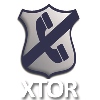 Ethical Hacking and Forensic Computing Laboratory Development of Mobile Applications In this space, the development of projects related to software that can help to generate solutions is promoted, in particular in the development of applications for mobile devices, augmented reality and mobile computing.
Ethical Hacking and Forensic Computing Laboratory Development of Mobile Applications In this space, the development of projects related to software that can help to generate solutions is promoted, in particular in the development of applications for mobile devices, augmented reality and mobile computing.
One of the most recent developments from the UBILAB Research and Development area was an application, XTOR®, for Android mobile devices that can help to stop extortion phone calls. Two students from the Engineering in Information Technologies department worked approximately four weeks on the development of the application, which included needs analysis, the design of the application, the development of it, as well as functionality and usability testing.
LC 24: Software Development Laboratory
This laboratory is specifically used for projects related to software research, development and innovation. In this space, students have the necessary tools to carry out a variety of activities.
This specialized laboratory supports subjects such as Software Engineering I and II, Virtual Systems, Requirements Engineering and Systems Modeling.
LC 25: Embedded Systems Laboratory.
This laboratory is equipped with different specialized control systems that allow students to practice using various operating systems like Solaris ©, Linux ©, Windows ©.
It is also used by students for projects related to the creation of applications and the control of devices using equipment and technologies like Arduino © and Freescale ©. The UPSLP has specialized equipment from these brands of technology that make up part of a network of educational institutions associated with Freescale © with the aim of project development and research.
- Arduino © cards and components for distributed systems
- Development of embedded systems
- Assembly and programming of drones
- Freescale® prototype for NXP Cup
- Virtual Reality Software Testing on Oculus Rift ©
LC 26: Human Computer Interaction Laboratory.
In this laboratory, system development is carried out, which gives students the opportunity to conduct deep analyses that allow for field research that analyzes post-development results. This allows students to obtain results from the exchange of information about the exchange of information from software or hardware between users and computers.
- Human Computer Interaction Tests
The result of these studies allows students to carry out and perfect developments and implementations with the goal of minimizing manipulation errors, increasing user satisfaction, and making tasks and routine operations more efficient. The result of this training is better system interfaces, improved interface design, and the effective use of each one of the modules that make up those systems.
- Improvement and analysis of IHC test results
LC 28: Applied Computation Laboratory.
This space has equipment to conduct robotics and applied programming applications, such as basic computer equipment, kits for building and programming VEX robots as well as the possibility to work with other types of technology.
In this laboratory, practices related to the following subjects are done: Introduction to Computing, Programming I, II and III. The space is also used by members of the robotics club and by students pursuing a Manufacturing Technology Engineering degree that wish to do activities with the VEX equipment.
- Accessories and Components for VEX ©
- Testing area for VEX © & NAO © prototypes
- Testing area for VEX © & NAO © prototypes
- Development and programming for robots.
- Base Prototype competition®
- Prototype experiment.
LC 29: Telecommunications Laboratory I
This space is for running experiments for practices related to signals and systems, transmission and lines and antennas, the development of digital circuit prototypes, modulations, and telecommunications networks.
- Spectrum analyzer
- PCM Telephone System
- Measurement and experimentation equipment for frequency response of various antennas
- Function generators, oscilloscopes, switch-mode power supplies, and multimeters
LC 30: Telecommunications Laboratory II
This laboratory has computer equipment for data acquisition, signal processing, and basic virtual instrumentation. It has an advanced level of development because it has circuit simulation software, graphic programming and mathematical control sequences.
In this area, the student can experiment with a variety of types of digital modulations (FSK, ASK, PSK), analog modulations (AM-SSB, FM, PM), sequential modulations and transformation techniques for analog-digital modulations (PAM, PCM, PWM).
The specific areas of knowledge that this laboratory can be used for include: signal electronics, digital and analog control systems, antennas, modulations, transmission lines, telephony, television, radio spectrum, microwaves, satellite links, and point to point and multilink satellite links.
- Computer equipment for data acquisition and simulation
- Lucas Nülle® experimentation module for modulations
- Microwave receive and satellite dish
- Complete microwave transmitter with horn antenna
CNT Roof: EDUSAT link®
The Center for New Technologies has a parabolic antenna for the C-band link with the Eutelsat® 117 satellite (formerly Satmex® 8) equipped with a decoder, LNBF and the necessary tools for assembly, adjustment and orientation, which forms a part of practices in courses on microwaves and satellites.
- Solid 1.8 m satellite dish
- Decoder configuration parameters
- MPEG-2 DVB Decoder
- Inclinometer for antenna orientation
LC 31: LabView Laboratory©
This laboratory has all the equipment necessary for students to achieve basic certification in LabView© in the area of data acquisition.
The main equipment is USRP© 2 GHz, USRP© 4 GHz, Elivs©, Emona© and different accessories used in multimeters and oscilloscopes.
This space can be utilized for the development of practices in the following courses: Digital Systems, Communications I and II, Telematics II, Telematic Systems I and II, and Electrical Circuits II.
- NI Emona DATEx©
- NI ELVIS II©
- NI MyDaq©
- NI USRP 2920©
LC 32: Structured Cabling Laboratory and Project Development.
Thanks to the fact that it has a variety of equipment for carrying out wiring assembly and installation according to current IEEE© and EIA/TIA© norms, this laboratory can be used for practices related to course required for certification and specialization in structured cabling, which is a foundational subject in Telematic Engineering. In addition, this space has the necessary equipment, such as tools, communications equipment, telephony equipment as well as post-installment diagnostic equipment.
- Hybrid telephone switches
- Fiber Optic Experimentation Tools and Equipment
- 650nm test laser for fiber transmission.
- Complete electric power supply panel
In the future, it is expected that this laboratory will be equipped with the equipment necessary, such as specialized security and communications equipment, to carry out practices to obtain the CCNA Security © certification.
LC 33: Computer Architecture Laboratory/IT Essentials ©
 Thanks to the different equipment used in the assembly and maintenance of computers in this laboratory, students can use it for practices in subjects related to A+ © Certification (based on the current Cisco IT ESSENTIALS © program). This provides students the infrastructure to carry out problem solving activities and methodologies directly on the computers.
Thanks to the different equipment used in the assembly and maintenance of computers in this laboratory, students can use it for practices in subjects related to A+ © Certification (based on the current Cisco IT ESSENTIALS © program). This provides students the infrastructure to carry out problem solving activities and methodologies directly on the computers.
Currently this laboratory has the infrastructure and equipment ideal for students to develop the necessary skills in computer architecture and digital systems.
- Work environment and components for building PCs
- Assembly and testing station for logic circuits
- Tools for PC maintenance and diagnosis
- Digital signals measurement on oscilloscope
LC 34: CCNA Laboratory ©
 Because of a variety of telecommunications equipment, this laboratory can be used in practices for subjects related to CCNA© Certification (Cisco Certified Networking Associate) and it provides students the infrastructure that allows them to carry out activities both using simulators and state of the art hardware.
Because of a variety of telecommunications equipment, this laboratory can be used in practices for subjects related to CCNA© Certification (Cisco Certified Networking Associate) and it provides students the infrastructure that allows them to carry out activities both using simulators and state of the art hardware.
- Communications Equipment
Currently this laboratory has infrastructure that ensures that students have access to the Internet and permanent access to the online program of the NETSPACE© platform as well as to other services that allow them to develop customized prototypes of LAN and WAN networks.
- Assembly and Use of Panels
The university currently forms part of the Cisco program, and this laboratory, due to being named as an officially recognized training center, is also used to conduct training for new professors from both the university and universities throughout Mexico as well as to give support to improve how the resources that this certification provides are used.
- Construction of Network Cables
Students from a variety of universities, such as the UTSLP, ITSLP, UASLP-Faculty of Sciences, UASLP-Faculty of Engineering, ITSUPSLP, ITSUPRV, UPD, UPA UPZ, among others have access to this laboratory.
- Simulation
LC 35: Pearson VUE Certification Center©, Certiport©, and Conocer
This laboratory has the infrastructure necessary to carry out tests for different Pearson VUE sponsors, such as Oracle, Cisco, COMPTIA, among others, as well as online Certiport exams, which includes the Microsoft Office Suite, Macromedia, Adobe, MTA, and HP to mention a few.
Contact
FACEBOOK: https://www.facebook.com/cnt.upslp
E-mail: cnt@upslp.edu.mx
Blackboard: CNT: Applied programming laboratories and specialized laboratories


